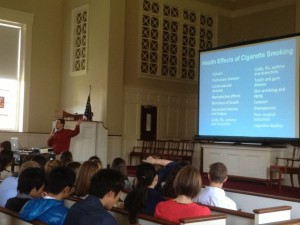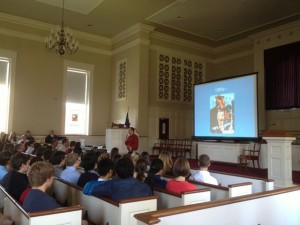 Dr. Tom Schiff began the special morning assembly at the Williston Northampton School with a personal admission.
Dr. Tom Schiff began the special morning assembly at the Williston Northampton School with a personal admission.
“I’m also a former smoker,” he said. “It’s a very hard thing to quit. So part of why I talk to people is that it is much easier to never start than it is to quit.”
As a health educator at the University of Massachusetts at Amherst, Dr. Schiff works on such issues as men’s health, violence prevention, and leadership. On April 24, though, he spoke to Williston students about another area in which he specializes—tobacco education and cessation.
Dr. Schiff is the most recent visitor in a series of special assemblies that have included such experts as Rachel Simmons, a nationally regarded speaker on bullying prevention and female empowerment; Dr. Christopher Overtree, director of the Psychological Services Center UMass and an expert on bullying prevention; and Rob Hackenson, a motivational speaker who specializes in the prevention of youth drinking and drug use.
During his 20-minute talk, Dr. Schiff shared grim statistics on tobacco use, noting that, with one death every six seconds attributable to smoking, some 200 people would die from tobacco-related causes during his talk. He asked the audience to put up their hands if they had a family member who had died of a tobacco-related illness.
“Take a look around and see all the hands that are up. That’s a lot of hands,” he said. “In my case, two of my grandparents died from tobacco-related illnesses.”
 While there were many health and safety reasons not to use tobacco, Dr. Schiff also pointed to the overall economic cost. If a pack of cigarettes cost $8, then a pack-a-day habit comes with a $2,920 price tag.
While there were many health and safety reasons not to use tobacco, Dr. Schiff also pointed to the overall economic cost. If a pack of cigarettes cost $8, then a pack-a-day habit comes with a $2,920 price tag.
There was an environmental cost, too, he said. Not only were discarded cigarettes a leading cause of forest fires, but they also created an enormous amount of litter. During the annual cleanup effort at UMass, “No Butts About It,” he noted that students could gather some 40 to 60 pounds of cigarette butts in a single three-hour period.
When it came to tobacco cessation, though, Dr. Schiff noted that each plan should be tailored to the individual, and should also acknowledge the reasons why he or she started using tobacco in the first place.
“Everybody has different ways of quitting,” Dr. Schiff said. “There are many different ways why we use [tobacco], it might be to manage stress, it might be to be social, it might be because you think it’s fun, so we need to find ways to replace those as well.”


